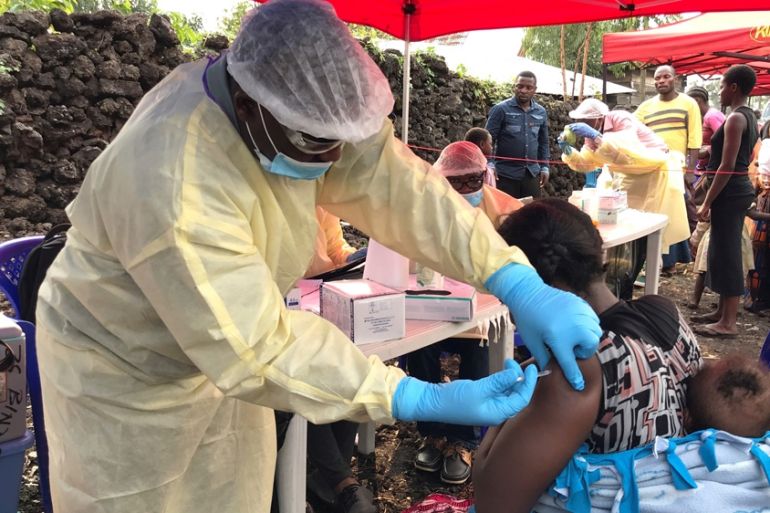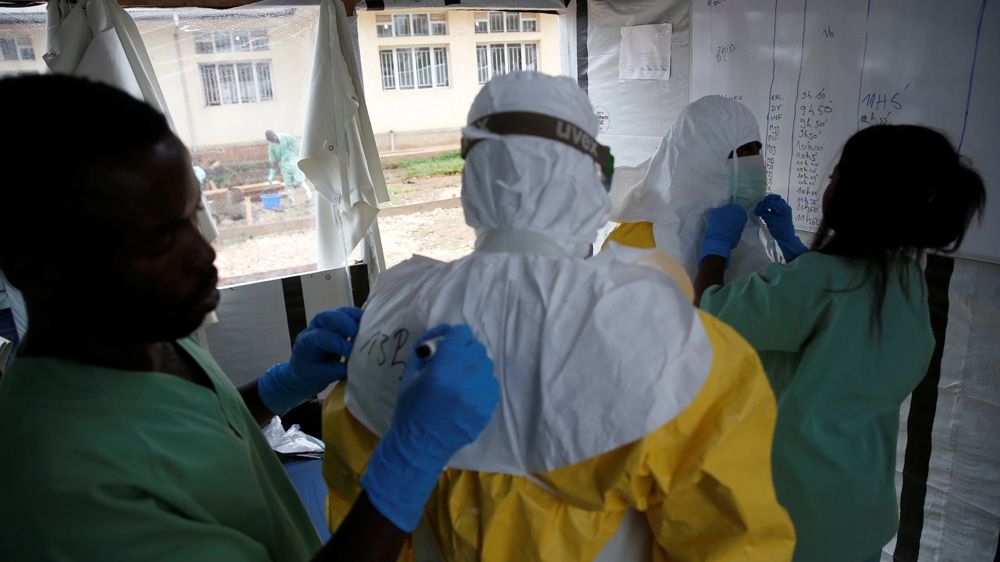Ebola in DRC: Three medics arrested over killing of WHO doctor
A local doctors association has threatened to strike if their colleagues are not released within 48 hours.

Three doctors from the Democratic Republic of the Congo have been arrested for their alleged role in the killing of a World Health Organization (WHO) doctor in April, according to military prosecutors.
Cameroonian doctor Richard Mouzoko was shot and killed during an attack on a hospital in Butembo, a city in North Kivu province and an epicentre of the Ebola response in the country. He had been sent to the eastern region as part of the WHO‘s attempt to stop the spread of the disease’s outbreak, the second deadliest on record.
Keep reading
list of 4 itemsUganda declares end of Ebola after 4-month outbreak
Uganda’s Ebola outbreak nearly under control, says Africa CDC
Ebola vaccines produced lasting antibodies during trial: Studies
A military prosecutor for Butembo, Lieutenant Colonel Jean-Baptiste Kumbu, told AFP news agency on Wednesday that the arrested doctors will be charged with “terrorism” and “criminal conspiracy”.
The three medics are accused of holding meetings on April 14 to plot the assassination of Mouzoko, the prosecutor said. A fourth doctor suspected to be involved in the April 19 killing is still at large, he added.
Kumbu said captured members of an armed group believed to be behind the killings implicated the four doctors during interrogations.
Prosecutors did not allege a motive for the arrested health workers, but a treatise left behind at the attack site had previously lead prosecutors to believe the assailants belonged to the armed group, the Patriotic Union for the Liberation of Congo, the Reuters news agency had reported at the time.
Threat of strike
The arrests were decried by doctors in Butembo. ln a letter to the mayor of the city, the local branch of the DRC’s national doctors council said they would go on strike if their colleagues were not released within 48 hours.
Medics in Butembo had previously protested and threatened to strike if security was not increased for health workers in the area.
“This is causing a great deal of concern,” said Al Jazeera’s Malcolm Webb, reporting from Nairobi, the capital of neighbouring Kenya.
“With the outbreak of the Ebola crisis going on, people are very worried about the consequences of a strike of medical staff going ahead.”
The DRC’s coordinator for Ebola response, Jean-Jacques Muyembe, called the investigation a “delicate situation”.
“As a man has died, we absolutely have [to] know the truth about what happened,” he told AFP.
A ‘delicate situation’
The DRC’s 10th Ebola outbreak emerged in the eastern provinces of North Kivu and Ituri in August 2018, with more than 1,800 people killed so far.
International organisations often work closely with local doctors in their attempts to contain the highly infectious disease that spreads through bodily fluids.
But the emergency health response has proven particularly difficult as several armed groups operate in the mineral-rich region, which is far removed from the central government in Kinshasa and fraught with tensions over land, ethnicity and resources.
Amid the turmoil, health workers and emergency responders have struggled to win the cooperation of affected communities, many of which are deeply distrustful of the government and a roll-out of medical strategies – supervised by security forces – that have clashed with local customs.
Ebola treatment centres and health workers have repeatedly been subjected to attacks; an unofficial tally puts the number of health workers killed at seven, with more than 50 seriously wounded since the start of the outbreak, which has been declared a public health emergency of international concern.
In April, WHO chief Tedros Adhanom Ghebreyesus said the organisation would not be swayed by the violence.
“We will not be intimidated,” he said. “We will finish our work.”
